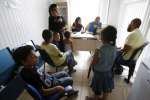- Text size
 |
|  |
|  |
| 
- عربي
UNHCR's Guterres and Jolie Pitt address UN Security Council on Syria
News Stories, 24 April 2015
NEW YORK, United States, April 24 (UNHCR) – UN High Commissioner for Refugees António Guterres on Friday warned that the international community must do everything possible to prevent a further deterioration of the situation in the Middle East before it becomes irreversible.
"The situation in the Middle East is a cancer that risks spreading and metastasizing. If things continue this way, we could see future developments spin out of control, independently of our will and with increasingly dangerous global consequences," he warned in an address in New York to the UN Security Council.
The High Commissioner said the regional spillover effects of the Syrian conflict were taking on dramatic proportions. "Fourteen million people are now displaced due to the interlinked crises in Syria and Iraq. Security threats to neighbouring countries are growing. As a result, we have been observing a steady deterioration in the protection space for Syrians trying to escape the conflict," Guterres said.
He added that UNHCR was seeing a growing fatigue on the part of the hosts and, in some areas, harsher policies imposed on refugees. There were increasing tensions between communities. Meanwhile, humanitarian agencies like UNHCR and the World Food Programme struggled to meet needs. Many, desperate to escape, were risking their lives on Mediterranean crossings.
And dangerous coping mechanisms were on the rise, he said, with more and more families forced to send children to work or marry off their teenage daughters. There are also reports of refugees resorting to survival sex to make ends meet.
Guterres said that only a political solution could end the suffering, but stressed that so long as that remained a distant prospect the international community must do all possible to prevent the crisis spiralling out of control. "First, some immediate priorities must be addressed: providing more humanitarian aid to refugees and vulnerable host communities, and stopping the horrific loss of life in the Mediterranean," he stressed.
"Second, there has to be massively increased support to the neighbouring countries. The funding announced in Kuwait last month to support the Regional Refugee and Resilience Plan is an important signal of hope and must now be disbursed quickly. But it is also essential for the structural investment programmes presented by the host governments to receive development funding from the international community."
The High Commissioner called for a rethink of development cooperation policies to help host countries cope better with the extra burden.
Thirdly, the High Commissioner said, "We have to recognize the increasingly protracted nature of this refugee crisis. UNHCR's ultimate priority objective remains voluntary repatriation in safety and dignity, in line with what most refugees prefer. But we have to recognize that for Syrians, this option is not immediately in sight."
"In the meantime, neighbouring countries will require adequate help to manage the vast economic, demographic and fiscal impacts of the refugee influx," he noted, while adding: "With more support across the region, we could help turn refugees' situation around from one of dependency and unsustainability to one where their economic self-reliance becomes an option, allowing them to also contribute to the development of their host societies."
But Guterres predicted more bad times ahead. "One thing is clear: the situation in the region has become utterly unsustainable. After Iraq became so dramatically engulfed in the Syrian conflict with the attacks on Mosul and Tikrit last year, I do not know where the next disrupting shock will take place. I only know that it will come, and that things risk getting even worse," he said.
Meanwhile, UNHCR Special Envoy Angelina Jolie Pitt, who has made 11 visits to Syrian refugees in Iraq, Jordan Lebanon, Turkey and Malta since the crisis erupted in March 2011, told the Security Council that the United Nations was failing the people of Syria.
"So on behalf of Syrian refugees, I make three pleas to the international community: The first is an appeal for unity. It is time for the Security Council to work as one to end the conflict, and reach a settlement that also brings justice and accountability for the Syrian people," she said.
"Second, I echo what has been said about supporting Syria's neighbours, who are making an extraordinary contribution," Jolie Pitt added. "If we cannot end the conflict, we have an inescapable moral duty to help refugees and provide legal avenues to safety." The Special Envoy said her third plea was for a greater response from the international community to the barbarism of those inflicting systematic sexual violence.
"We also need to send a signal that we are serious about accountability for these crimes, for that is the only hope of establishing any deterrence. And I call on member states to begin preparations now so that Syrian women are fully represented in future peace negotiations, in accordance with multiple resolutions of the Security Council."
Read Remarks by António Guterres, United Nations High Commissioner for Refugees, New York, 24 April 2015









































